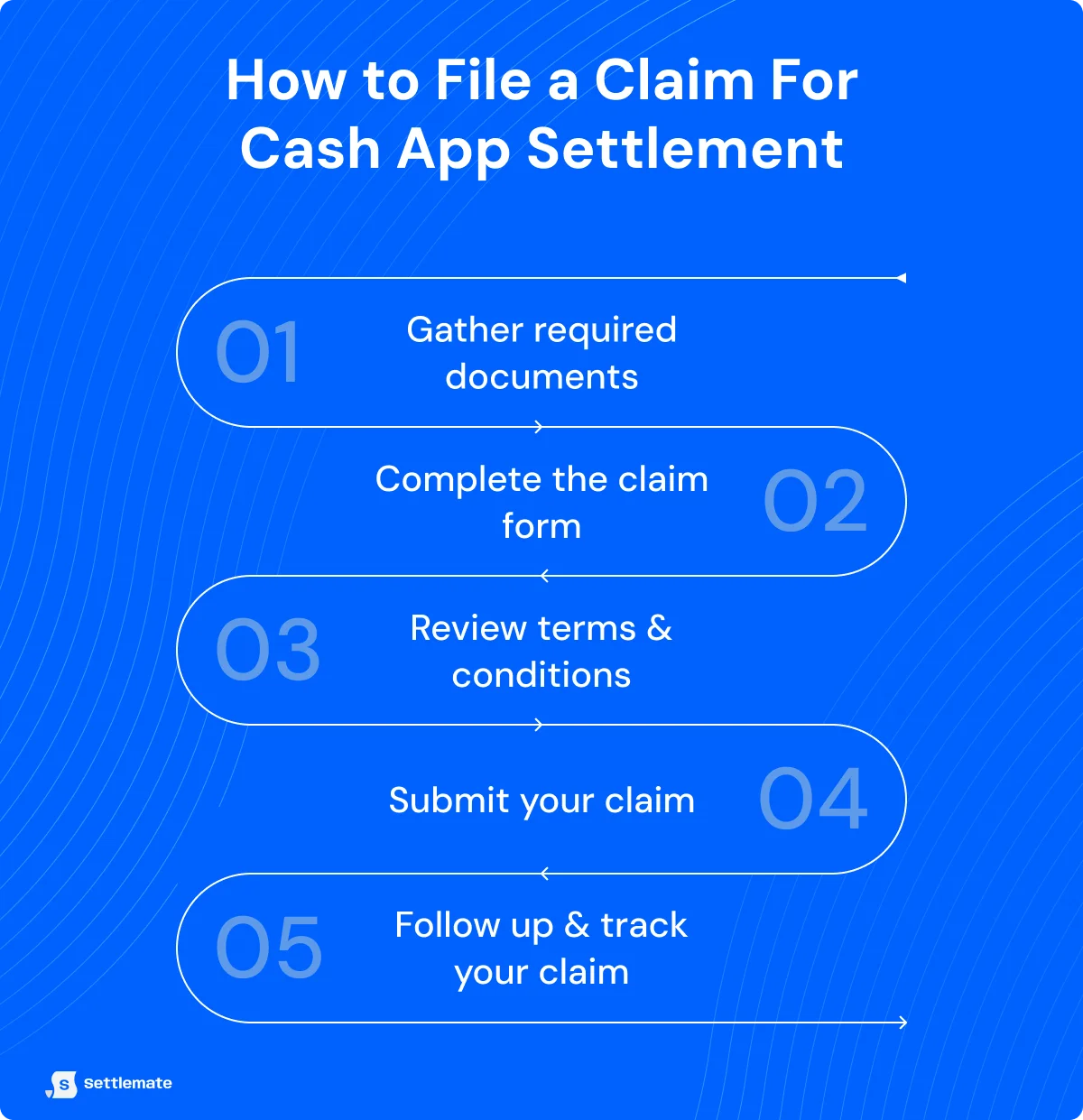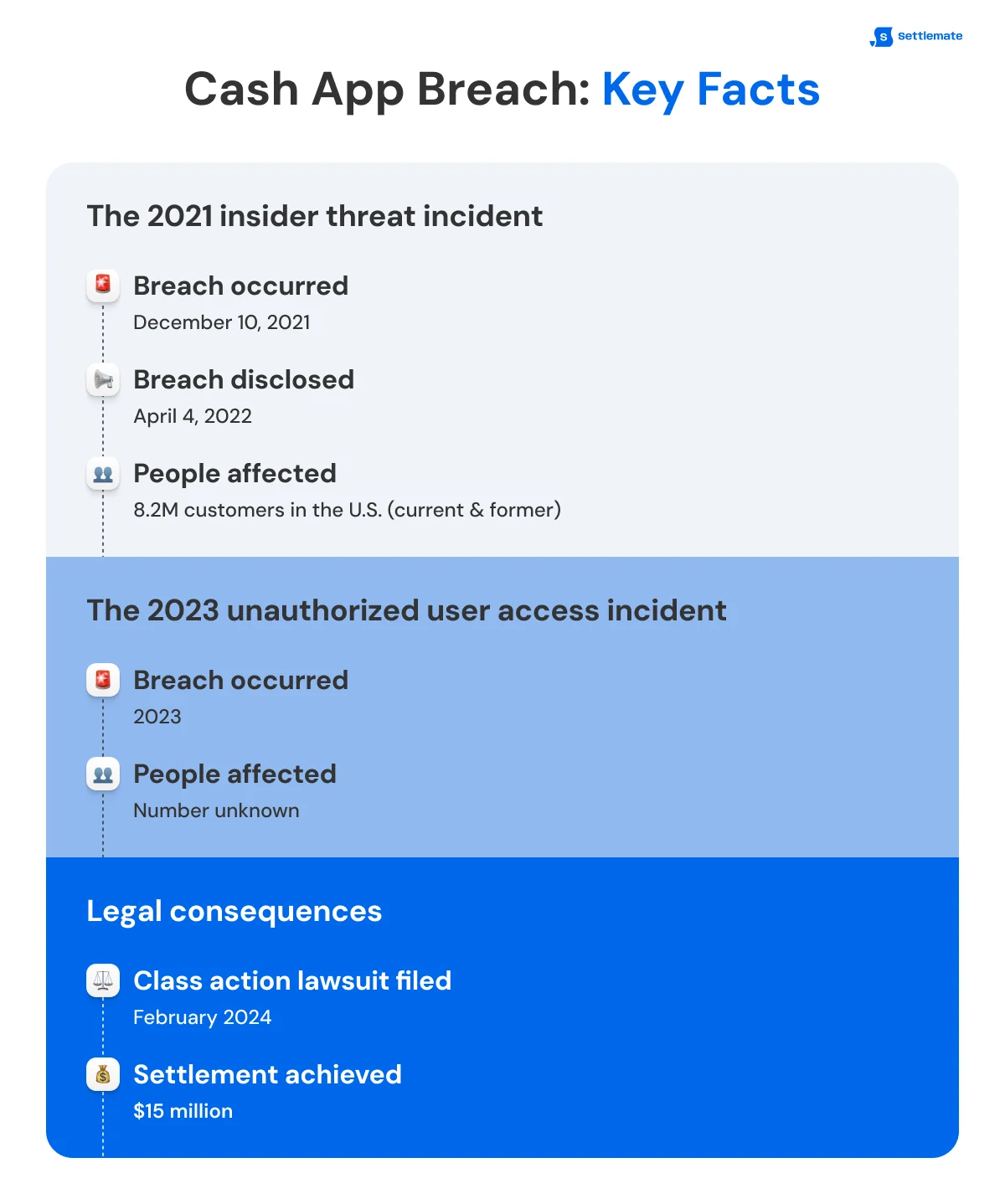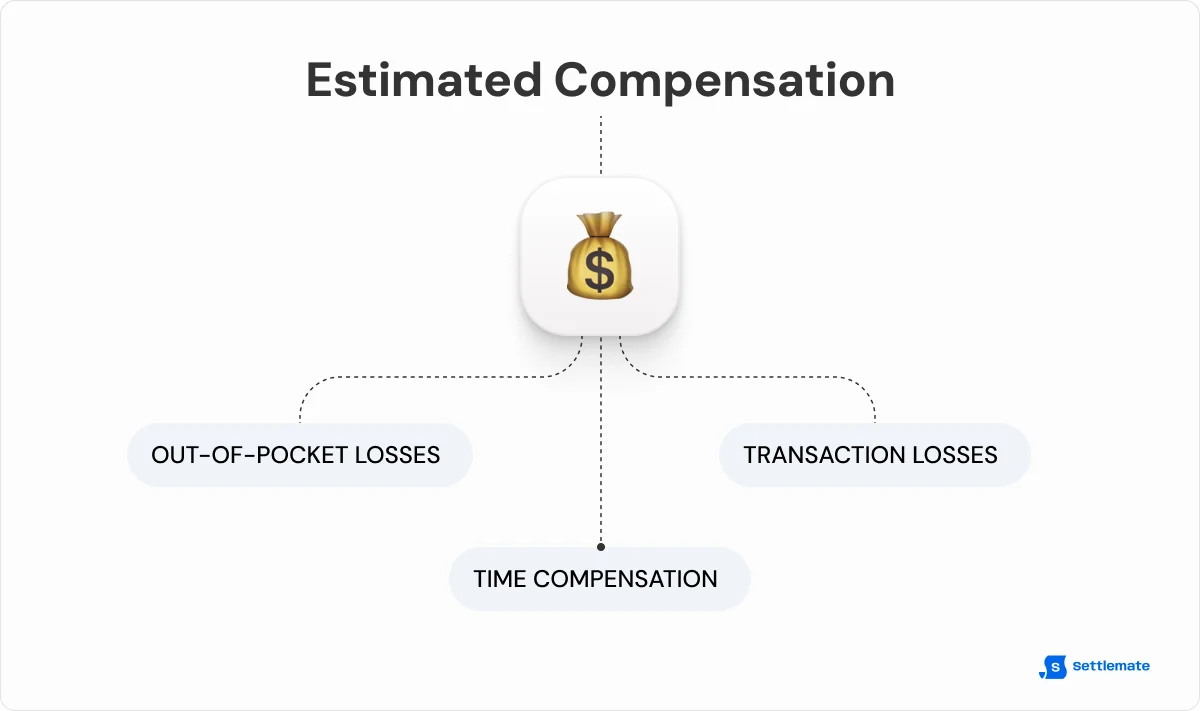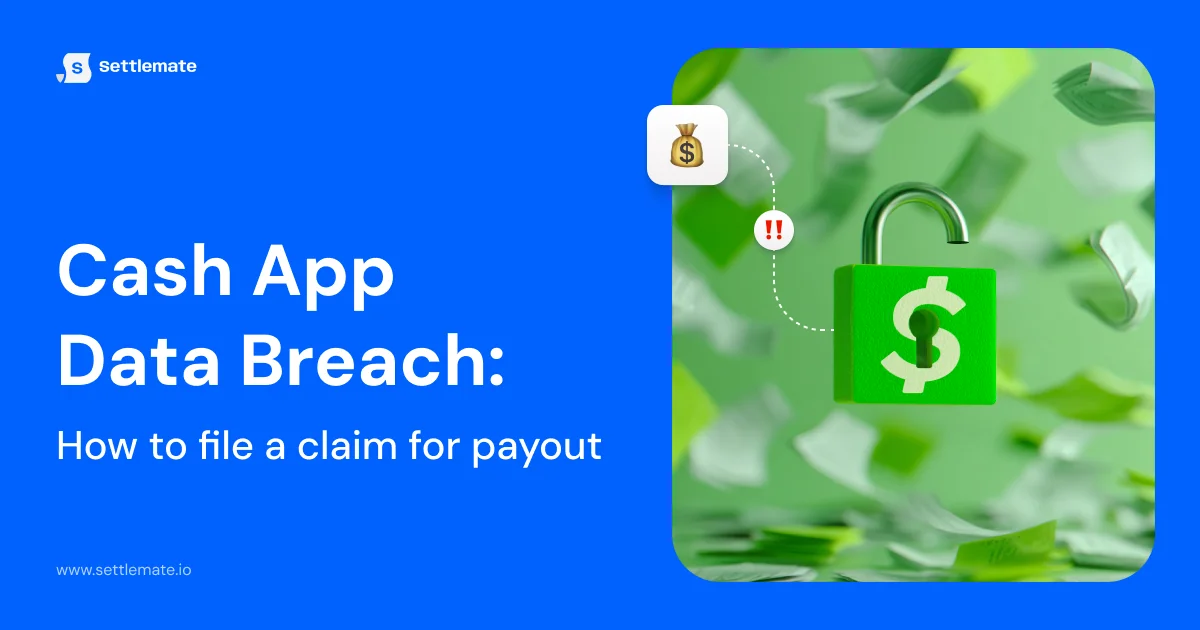Have you ever sent money to a friend or paid for something on Cash App without thinking twice? Most of us have. It's fast, convenient, and built on trust.
That trust has helped Cash App become one of the most widely used digital wallets in the U.S., serving 57 million monthly active users as of Q1 2025.
That is exactly why news of data breaches hit so hard.
The good news: there's a resolution. This guide shows you exactly how to check if you qualify, how to file a claim for Cash App data breach, and what compensation you can expect.
Key takeaways about Cash App data breach:
- Cash App faced major data breaches: Breaches in 2021 and 2023 exposed sensitive customer data, including account details and investment information. Some users also reported unauthorized withdrawals, leading to a $15 million settlement.
- Not every user qualifies for compensation: Only those who can prove they were directly affected are eligible. You qualify only if you were directly affected, such as having your account accessed, your data exposed, or fraudulent transactions left unresolved.
- Filing a claim requires documentation: To strengthen a claim, users should gather proof such as bank statements, receipts for fees or monitoring services, and any official notices from Cash App. Having detailed records increases the chance of approval.
- The process takes time: Administrators review each claim, the court approves the settlement, and the administrator calculates payouts. Payments typically arrive several months after approval, either by check or digital transfer.
- Settlemate simplifies the process: Instead of figuring it out alone, Settlemate matches you with class actions you may qualify for, guides you through filing, tracks your payouts in real time, and stores your documents securely.
What exactly are Cash App data breaches?
Cash App data breaches occur when unauthorized individuals gain access to users' sensitive financial information. This can include personal details, account numbers, or transaction history.
Such breaches may lead to privacy risks, identity theft, or even unauthorized withdrawals, which is why affected users are often eligible for legal settlements.

A Cash App data breach happens when someone accesses customer information without permission. This breach can lead to privacy issues and financial risks for users.
What happened in the most recent Cash App data breach?
Cash App experienced breaches in 2021 and 2023, exposing sensitive customer information and even causing unauthorized withdrawals.

The fallout led to a $15 million settlement for affected users, leaving many anxious and demanding answers.
December 2021 Cash App data breach
In December 2021, Cash App experienced a serious data privacy breach when a former employee downloaded sensitive customer reports without authorization. Although the individual had access to these reports while employed, they retrieved them after leaving the company, violating policy and trust.
Scope of the breach:
- Approximately 8.2 million current and former U.S. customers were affected.
- Exposed data included:
- Full names
- Brokerage account numbers
- Portfolio values, holdings, and even stock trading activity for one day (for some users)
- Importantly, no one gained access to usernames, passwords, Social Security numbers, bank details, or other highly sensitive PII.
Company's response and notification:
- Block, Inc. (Cash App's parent) filed an official disclosure with the U.S. Securities and Exchange Commission in April 2022, publicly acknowledging the incident.
- The company immediately began notifying affected users, notifying law enforcement and regulatory authorities, and engaged a forensics firm to investigate.
- Block emphasized it was reviewing and strengthening its internal security safeguards.
2023 Cash App data breach
According to the class-action lawsuit, unauthorized actors exploited recycled phone numbers in 2023 to gain access to certain Cash App accounts. Recycled phone numbers remained linked to old accounts, allowing intruders to gain access.
This lets intruders bypass security controls, access account information, and even initiate unauthorized transactions.
Alleged failures in security
The lawsuit claims that Cash App and its parent, Block Inc., failed to implement effective measures to prevent this kind of unauthorized access. These omissions included inadequate verification processes and insufficient controls around account recovery tied to phone-number validation.
Who qualifies for compensation in the Cash App settlement?
Not all Cash App users will get a payout. The settlement is limited to individuals who can demonstrate they were directly affected by the breaches. In legal terms, this group is called the "Class."
Here's what that means in practice:
1. You used Cash App or Cash App Investing during the breach period
To be part of the settlement class, you must have been a Cash App or Cash App Investing user at some point when the breaches occurred.
Qualifying use isn't just logging in. It can include:
- Sending or receiving money: If you used Cash App to transfer funds to friends, family, or businesses, you fall under active usage.
- Holding a balance: Even if you didn't make transactions, keeping funds stored in your Cash App account counts as using the service.
- Investing with Cash App: You qualify if you opened or managed a brokerage account through Cash App Investing.
It's important to note that former users can still qualify. You may still be part of the class if you closed your account, but Cash App's systems continued to store your personal information during the breach.
2. Your account or information was compromised
Having a Cash App account during the breach doesn't automatically qualify you.
To receive compensation, you must show direct impact, which the settlement defines in several ways:
- Unauthorized access to your account: If someone other than you gained entry to your Cash App or Cash App Investing account, you're considered affected. This includes situations like intruders using recycled phone numbers, old login links, or other vulnerabilities to view or take over your account.
- Exposure of personal information: If Cash App notified you that your name, account number, or investment details were part of a data breach, you qualify. Even if no one stole your money, the exposure of your personal financial information makes you eligible for inclusion.
- Fraudulent withdrawals or transfers: You qualify if someone has withdrawn money from your Cash App or linked accounts without your approval.
- Failure to resolve reported errors: You also qualify if you reported suspicious activity, missing funds, or account errors, and Cash App did not fix the problem.
Examples of who likely qualify:
- You received an official breach notice from Cash App or Block Inc. informing you that your data was exposed.
- Someone else accessed your account, for example, through a recycled phone number still tied to your old account.
- You experienced unauthorized withdrawals or transfers, and Cash App failed to resolve the issue or refund your money.
Who does not qualify:
- Users who had Cash App accounts but never experienced unauthorized access, fraudulent activity, or a breach notification.
- Users whose issues were resolved correctly and reimbursed by Cash App, as they did not suffer an actual loss.
Step-by-step: How to file a claim for Cash App data breach
If you believe you qualify, here's how to file a claim for the Cash App data breach settlement payout:
1. Confirm your eligibility
First, check that you fall within the settlement class (see "Who Qualifies" above). In short, you should have been a Cash App or Cash App Investing user during the period covered by the lawsuit and experienced unauthorized account access, fraudulent transactions, or unresolved errors.
- If you received an official notice by email or mail, that's strong evidence that you qualify.
- If you didn't receive a notice but believe you were affected, you can still file a claim. Be ready to explain why you qualify and provide supporting details.
2. Gather your documentation
Strong claims include proof of your losses. Collect any documents that show you were impacted, such as:
- Receipts or invoices for costs related to the breach (credit monitoring, bank fees, etc.)
- Bank or credit card statements with fraudulent charges or fees
- Emails or messages with Cash App support about unauthorized activity
- Police or identity theft reports (if applicable)
- Official notice letters or emails from Cash App about data breaches
You don't need every single document, but provide as much evidence as possible.
3. Visit the official settlement website
The only legitimate place to file a claim is the official settlement administration site.
On the homepage, click the "Fix Claim" button to access the online claim form. Avoid third-party sites or emails claiming to handle claims.
Prefer paper claim form? Call the Settlement Administrator at 1-866-615-9740 to request a mailed form.
4. Fill out the claim form
The claim form will ask for your:
- Name, contact information, and Cash App username ($Cashtag)
- Claim ID and Confirmation Code (if you received a personalized notice)
- Details about how you were affected (breach notice, unauthorized withdrawals, failed resolution of errors, etc.)
You'll then select the types of compensation you're requesting:
- Out-of-pocket costs (expenses like overdraft fees, monitoring services)
- Lost time (hours spent resolving fraud or monitoring accounts)
- Transaction losses: Cash App took money from your account and did not reimburse it.
Be specific. List amounts, provide descriptions, and upload supporting documents (PDFs, images, or scans). If filing by mail, attach copies of your documents and send them to the Settlement Administrator's address listed on the form. Always keep a copy for your records.
5. Submit before the deadline
You must file your claim by the official deadline listed on the settlement website. Claims submitted after the cutoff will not be accepted under any circumstances. That means if you wait too long, even by a single day, you lose your chance at compensation.
Practical tips:
- File early: Don't wait until the final day. Websites sometimes crash under heavy traffic, and the post office can delay mailed forms.
- Save your proof: Once you submit online, you'll receive a confirmation number or email. Keep a screenshot or print a copy for your records. If you file by mail, make copies of your form and documents before sending them.
What to do if you missed the deadline
Unfortunately, the claim deadline has passed. As the official settlement site clarifies, late claim forms are not being accepted.
Here's what that means, and if you have any options:
- No claim, no payout: If you didn't file before the deadline, you won't receive any money. Late claims aren't accepted.
- Still bound by the settlement: You remain part of the class unless you opted out earlier. That means you give up the right to sue separately, even without a payout.
- Few options left: You can contact the Settlement Administrator at 1-866-615-9740, but late claims are rarely approved.
- Learn for the future: Always check notices and deadlines for class action settlements so you don't miss out again.
- Stay vigilant: Even without compensation, keep monitoring your accounts, update passwords, and consider identity protection.
What to expect after filing your claim
Once you've filed your claim, here's what happens next:
Claim review
After you file your claim, the settlement administrator will review it to make sure you're eligible and that your documents are in order. This step can take time because thousands of people may be filing at once.
If your claim is missing something, for example, you listed expenses but didn't upload receipts, you might receive a Deficiency Notice by email or mail. That's a request to provide more information.
Court approval
The court must give final approval before the administrator sends out any money.
Usually, judges approve settlements if they're fair, but sometimes they ask for changes, or a few people may file objections.
In rare cases, appeals can delay the process further. You don't need to attend this step, since the court, lawyers, and settlement administrator handle it.
Payment timeline
Even after approval, payments don't arrive right away. The administrator needs to calculate the value of each valid claim. If total claims exceed the settlement fund, the administrator adjusts payouts to ensure everyone receives a fair share.
This calculation and distribution process usually takes several months. Most class action settlements take 3 to 6 months after approval before checks or electronic payments arrive.
How you'll receive payment
Most people will receive their payment by check at the address they provided when filing the claim.

In some cases, settlements also offer digital payment options like PayPal, Venmo, or direct deposit. Always keep your mailing address up to date with the settlement administrator to avoid missing your payment.
Taxes
For most people, these settlement payouts count as reimbursements, not income, so they usually aren't taxable.
You typically won't get a 1099 form unless your payout is unusually high or includes additional amounts like interest.
Stay informed
The easiest way to stay updated is by checking the official settlement website or reading emails from the settlement administrator.
They'll post updates like "Settlement Approved" or "Payments on the Way." If you've moved or changed your email since filing, please update your contact information to ensure you don't miss any important notices.
How Settlemate helps you win with class actions
If Cash App taught us anything, it's that even trusted apps can fail.
This guide showed you exactly how to file a claim for Cash App data breach compensation, from checking your eligibility to submitting your documentation and tracking your payout.
But the Settlemate app goes one step further. Settlemate makes the entire claims process simple and stress-free.
Here is how it works:
- Smart claim matching: The AI-powered system reviews purchases, services, and known data breaches to connect you with settlements you may qualify for. With your permission, it can also check your inbox for notices or receipts tied to active cases, so you never miss potential compensation.
- Step-by-step claim support: When Settlemate finds a match for you, it walks you through exactly how to file. You can follow the steps yourself or allow the platform to handle the process automatically, making it as easy as shopping online.
- Real-time payout tracking: Through your dashboard, you can see the progress of every claim, from submission to approval to payment. This approach eliminates guesswork and keeps everything in one place.
- Secure document storage: Upload receipts, account statements, or other proof directly to Settlemate. Your documents remain safe and organized without the hassle of mailing or faxing.
Ready to claim your share from the Cash App settlement or any future class action?
Settlemate helps you understand how to file a claim for Cash App data breach and makes it easy to secure your share in other settlements, too.
Sign up for Settlemate today and never miss another payout.









